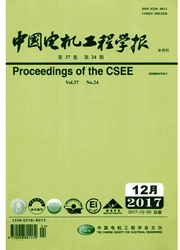

 中文摘要:
中文摘要:
三相变流器的输出阻抗矩阵特性对系统的稳定性有重要影响。无论在静止坐标系还是dq坐标系下,由于锁相环或电网等原因,变流器和电网的阻抗矩阵难以同时对角化解耦。耦合项的存在导致基于阻抗的变流器并网系统小干扰稳定性分析方法十分复杂或存在较大误差。为此,该文基于特征方程降阶的思路,在一定假设条件下提出可分析变流器系统小干扰稳定性的广义阻抗判据。首先,在极坐标下建立变流器端口和电网端口的小信号阻抗模型,并在此基础上定义了变流器及电网的广义阻抗。其次,利用严格的数学变换得到了反映变流器与电网交互影响的降阶特征方程。研究表明,系统振荡可以看作变流器与电网广义阻抗间的串并联谐振,广义阻抗判据是传统阻抗判据的扩展,在控制器外环和锁相环动态都可以忽略的前提下广义阻抗判据和正负序阻抗判据等价。最后,数字仿真和基于RT-LAB的硬件在环仿真验证了广义阻抗判据的有效性。
 英文摘要:
英文摘要:
The output impedance matrix of grid-connected converter plays an important role in system stability. Due to the dynamics of power grid or phase locked loop (PLL), the output impedance matrices of the converter and grid are difficult to be decoupled simultaneously either in dq domain or in phase domain. This has become a difficulty for system oscillation analysis via impedance-based stability criterion (ISC). To this end, the generalized-impedance-based stability criterion (glSC) was proposed to handle the coupling terms and simplify the system stability analysis under some sufficient conditions. Firstly, the impedances of the converter and the grid in polar coordinates were formulated, and the concept of generalized-impedance of the converter and the grid was put forward. Secondly, by strict mathematical derivation, the critical equation, which implies the dynamic interaction between the converter and the grid, was extracted from the characteristic equation of the grid-connected converter system. It is shown that the small-signal instability of the system can be explained as the resonance of the generalized-impedances of the converter and the grid. Moreover, the glSC can be regarded as the extension of ISC, and the gISC is equivalent to ISC when the focused frequency is out of the bandwidth of outer-loop control and PLL. Finally, digital simulation and hardware-in-the-loop (HIL) simulation based on the RT-LAB were carried out to verify the effectiveness of the proposed method.
 同期刊论文项目
同期刊论文项目
 同项目期刊论文
同项目期刊论文
 期刊信息
期刊信息
